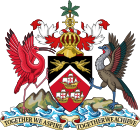Our website is made possible by displaying online advertisements to our visitors.
Please consider supporting us by disabling your ad blocker.
Politics of Trinidad and Tobago
This article needs additional citations for verification. (June 2018) |
 |
|---|
|
|
The politics of Trinidad and Tobago function within the framework of a unitary state regulated by a parliamentary democracy modelled on that of the United Kingdom of Great Britain and Northern Ireland, from which the country gained its independence in 1962. Under the 1976 republican Constitution, the monarch was replaced as head of state by a President chosen by an electoral college composed of the members of the bicameral Parliament, consisting of the Senate and the House of Representatives.
The country has remained a member of the Commonwealth, and has retained the Judicial Committee of the Privy Council in London as its highest court of appeal. The general direction and control of the government rests with the Cabinet, led by a Prime Minister. The Prime Minister and Cabinet are answerable to the House of Representatives. The 41 members of the House are elected to terms of at least five years. Elections may be called earlier by the president at the request of the prime minister or after a vote of no confidence in the House of Representatives. In 1976, the voting age was reduced from 21 to 18. The Senate's 31 members are appointed by the President: 16 on the advice of the prime minister, six on the advice of the leader of the opposition, and nine independents selected by the President from among outstanding members of the community. Local government is through nine Regional Corporations and five municipalities. Tobago was given a measure of self-government in 1980 and is governed by the Tobago House of Assembly. In 1996, Parliament passed legislation which gave Tobago greater self-government. In 2005 Parliament approved a proposal by the independent Elections and Boundaries Commission to increase the number of seats in the House of Representatives from 36 to 41.
Party politics has generally run along ethnic lines, with most Afro-Trinidadians supporting the People's National Movement (PNM) and most Indo-Trinidadians supporting various Indian-majority parties, such as the current United National Congress (UNC) or its predecessors. Most political parties, however, have sought to broaden their purview. In the run-up to the 2007 general election, a new political presence emerged called Congress of The People (COP). Led by Winston Dookeran, the majority of this membership was formed from former UNC members. Despite gaining a significant but minority share of the vote in various constituencies, the COP failed to capture a single seat.
An early general election was called on 16 April 2010, and was held on 24 May 2010.[1] Two major entities contested the election: the incumbent PNM, and a coalition called the People's Partnership, led by UNC leader Kamla Persad-Bissessar, comprising the UNC, COP, Tobago Organisation of the People (TOP), and two labour and non-governmental organisations: the National Joint Action Committee and the Movement for Social Justice.[2] The People's Partnership won 29 seats and the majority, with Kamla Persad-Bissessar being sworn in as the country's first female prime minister on 26 May 2010. The PNM won the remaining 12 seats and comprised the opposition in parliament.
After the period a new party also emerged from an ex-member of the United National Congress, known as the Independent Liberal Party which was founded by FIFA ex-vice president Jack Warner.
In the 2015 general election resulted in a victory for the People's National Movement, which won 23 of the 41 seats led by Keith Rowley.[3] In August 2020, Prime Minister Keith Rowley’s ruling party PNM won the general election again.[4]
- ^ Hutchinson-Jafar, Linda (16 April 2010). "Trinidad and Tobago sets early election May 24". Reuters. Retrieved 21 July 2022.
- ^ "A look at The People's Partnership". Trinidad and Tobago Newsday. 23 April 2010. Retrieved 21 July 2022.
- ^ "Opposition party wins elections in Trinidad and Tobago". Reuters. 8 September 2015.
- ^ "Trinidad and Tobago PM claims election victory for ruling party". Reuters. 11 August 2020.
Previous Page Next Page


